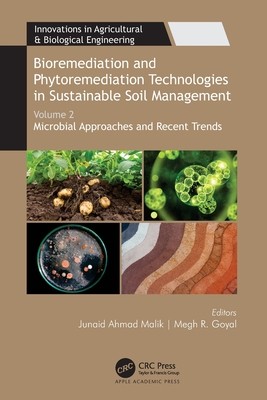
- We will send in 10–14 business days.
- Publisher: Apple Academic Press
- ISBN-10: 1774638924
- ISBN-13: 9781774638927
- Format: 15.6 x 23.4 x 1.8 cm, minkšti viršeliai
- Language: English
- SAVE -10% with code: EXTRA
Bioremediation and Phytoremediation Technologies in Sustainable Soil Management (e-book) (used book) | bookbook.eu
Reviews
Description
This 4-volume set focuses on the use of microbial bioremediation and phytoremediation to clean up pollutants in soil, such as pesticides, petroleum hydrocarbons, metals, and chlorinated solvents, which reduce the soil's fertility and renders it unfit for plant growth.
Volume 2: Microbial Approaches and Recent Trends focuses on new and emerging techniques and approaches to address soil pollution. These include the use of rhizobacteria, archaea, cyanobacteria, and microalgae as biofertilizers and for soil bioremediation efforts. New technologies for assessment of soil bioremediation are explored also. The chapters provide in-depth coverage of the mechanisms, advantages, and disadvantages of the technologies used and highlight the use of different microbial enzymes that are used in the process of bioremediation and phytoremediation to clean up different pollutants without causing damage to the natural environment.
Other volumes in the 4-volume set:
- Volume 1: Fundamental Aspects and Contaminated Sites
- Volume 3: Inventive Techniques, Research Methods, and Case Studies
- Volume 4: Degradation of Pesticides and Polychlorinated Biphenyls
Together, these four volumes provide in-depth coverage of the mechanisms, advantages, and disadvantages of the bioremediation and phytoremediation technologies for safe and sustainable soil management. The diverse topics help to arm biologists, agricultural engineers, environmental and soil scientists and chemists with the information and tools they need to address soil toxins that are a dangerous risk to plants, wildlife, humans and, of course, the soil itself.
EXTRA 10 % discount with code: EXTRA
The promotion ends in 21d.08:46:05
The discount code is valid when purchasing from 10 €. Discounts do not stack.
- Publisher: Apple Academic Press
- ISBN-10: 1774638924
- ISBN-13: 9781774638927
- Format: 15.6 x 23.4 x 1.8 cm, minkšti viršeliai
- Language: English English
This 4-volume set focuses on the use of microbial bioremediation and phytoremediation to clean up pollutants in soil, such as pesticides, petroleum hydrocarbons, metals, and chlorinated solvents, which reduce the soil's fertility and renders it unfit for plant growth.
Volume 2: Microbial Approaches and Recent Trends focuses on new and emerging techniques and approaches to address soil pollution. These include the use of rhizobacteria, archaea, cyanobacteria, and microalgae as biofertilizers and for soil bioremediation efforts. New technologies for assessment of soil bioremediation are explored also. The chapters provide in-depth coverage of the mechanisms, advantages, and disadvantages of the technologies used and highlight the use of different microbial enzymes that are used in the process of bioremediation and phytoremediation to clean up different pollutants without causing damage to the natural environment.
Other volumes in the 4-volume set:
- Volume 1: Fundamental Aspects and Contaminated Sites
- Volume 3: Inventive Techniques, Research Methods, and Case Studies
- Volume 4: Degradation of Pesticides and Polychlorinated Biphenyls
Together, these four volumes provide in-depth coverage of the mechanisms, advantages, and disadvantages of the bioremediation and phytoremediation technologies for safe and sustainable soil management. The diverse topics help to arm biologists, agricultural engineers, environmental and soil scientists and chemists with the information and tools they need to address soil toxins that are a dangerous risk to plants, wildlife, humans and, of course, the soil itself.


Reviews